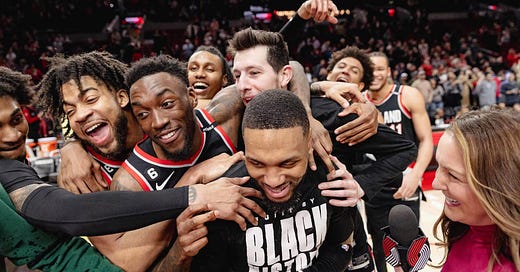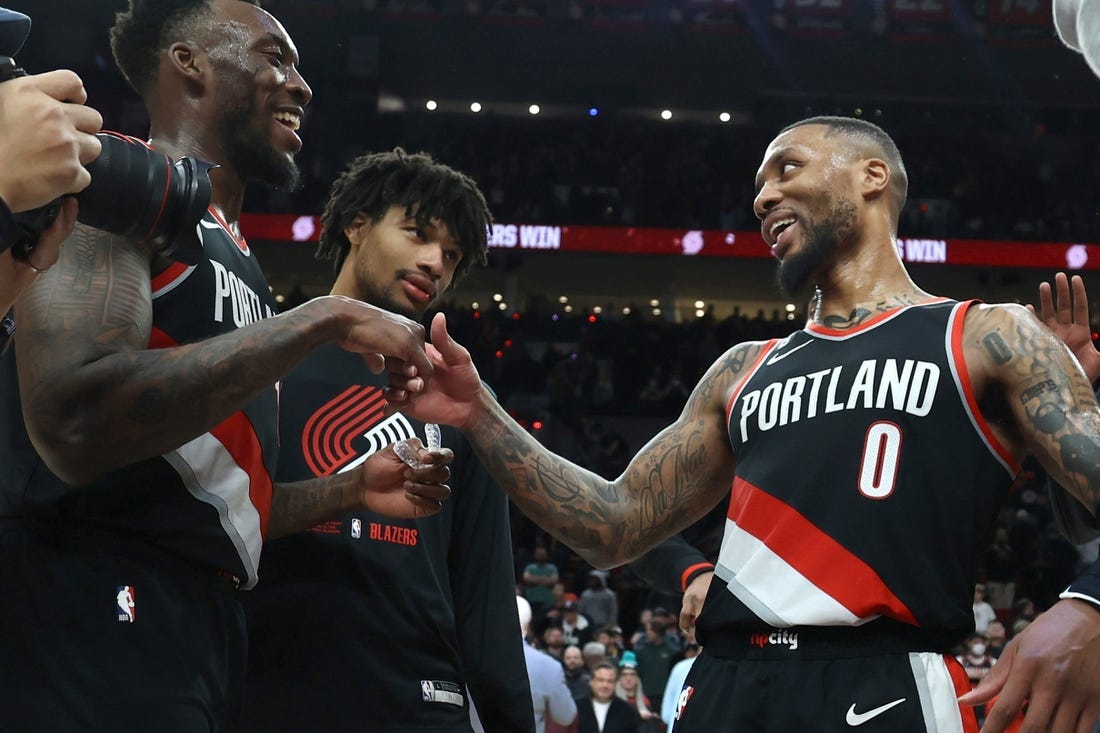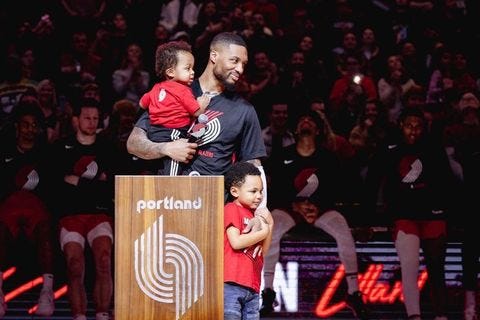Enjoy an audio reading of this piece, or scroll to keep reading.
I’m a chronic scroller. Compulsively mining timelines for content that catches my eye or, even better, captures my heart. Recently, on Twitter, I came across a clip of Portland Trail Blazers point guard Damian “Dame” Lillard sitting down with JJ Redick on his podcast, The Old Man and the Three. In the clip, Dame shares his thoughts on the current culture within and around the NBA.
Dame stands out in a league where the focus is often put on individual players and what those players will do in pursuit of a championship. Since 2012, he has spent his entire career with the Blazers. During that time, NBA superstars have made a habit of teaming up with each other for a better shot at winning. Despite this shift, Dame has stayed true to his teammates and the city he calls home—which is why Dame is one of the NBA’s most adored players. And it’s for these reasons that, when Dame speaks, his perspective is “refreshing,” as Redick puts it.

“The NBA that I play in now is not the NBA that I came into,” Dame begins. And while he acknowledges that the NBA was bound to evolve, he focuses on who he is. “I feel like I play for the love of the game,” Dame continues.
“I want the competition. I want to know what it feels like to win.” And then, in the portion that spoke to me most, Dame says, “I want to see my teammates do well. I want to see my teammates get paid.”
Lately, I’ve been thinking about what it means to look out for each other at work. To care for the people I work with beyond just the work we do together.
Growing up, I was taught to think about what you do for work as a badge of honor. And there was nothing worth celebrating more than the advances you made in your career. Years before I even got to college, I thought about the labor I wanted to do after college. For two summers in high school, I spent a week attending journalism camp at the University of Georgia. I was convinced I wanted to be on SportsCenter.
Within my Southern Baptist private high school, students were implored to find their “calling.” It sounds a lot more churchy than it was. They just wanted us to find our career path—with God’s help, of course—and the Christian college or university where we would pursue that path. Bonus points if you felt called to enter ministry. Looking back, it’s fascinating how entangled capitalism and Christianity are that religious callings often equate to wage labor. But that’s for another essay.
While I was in college, every decision I made about my major or minor felt like it would impact the rest of my life—to the point where I settled on what I perceived as a more general major in strategic communications, so I could have plenty of room to explore my career.
Within my program, we were required to have at least one professional internship, so my summers quickly went from driving around with my friends to taking on jobs in Colorado Springs and Atlanta after my sophomore and junior years.
As I started my career after college, I worked jobs as the only employee solely dedicated to social media. Where I work now, there are entire departments with multiple team members assigned to some of the tasks I used to have to complete. As I realized how much more of a reality that was at other companies, I knew I wanted my next job to be at a company where I could work on a dedicated social media team. I didn’t want to feel like all the responsibility fell on me.
For the past two years, through additions, exits, and reorgs, I’ve gotten to work with a few iterations of social media teams. My teammates have shown me healthier alternatives for work in a world where wage labor is still required to survive. Work teams don’t have to be framed as families—where you’re forced to get along, and boundaries are minimal. Our team cares because we want to. Because we genuinely value one another. Not for the work we each do but because of who we are.
We all aligned early on that work is not our lives. We value protecting our lives outside of work and help each other out if something threatens that work-life balance. One of the pains of being a one-person social media team is that you can easily never have a day off from posting. Even when you’re off, you’re on. Our team has attempted to solve that by alternating posting weekends, so we all get a weekend or two off from posting.
When real life gets heavy, or we’re not in a good headspace to work, the first response is “log off.” Not putting more work on each other to find coverage for everything. We’ll figure it out. And at the end of the day, it’s not the end of the world. The company will not fall apart because some of our work has to wait. Ultimately, we want each other to be good and have everything we need. That’s why I love Dame’s answer: “I want to see my teammates do well. I want to see my teammates get paid.”
Work is often viewed as an independent pursuit, reflective of capitalism’s individualism. Frequently, the focus is placed on workers climbing the “corporate ladder” to join a select few instead of helping everyone have what they need. People talk about there being “a seat” at the table instead of removing the table altogether, going outside, and making room for everyone to have space.
Through the years, I’ve learned all we have is each other. In the workplace, I’ve been able to lean on my teammates and find ways to laugh to keep from crying, to share experiences and ensure I’m not crazy, and to be able to celebrate the things we’re proud of. When I haven’t been able to do everything myself, I’ve been able to go to my teammates—and sometimes they’ve come to me before I’ve gone to them.
I tend to hold a view of wage labor, introduced to me by author Sarah Jaffe who wrote a book by the same name, that “work won’t love you back.” Jaffe explains love is “a thing that happens between people. It is necessarily reciprocal, like solidarity.” She continues, “Work cannot offer it, but people can. And it is precisely these bonds of solidarity that extend beyond the transactional relationships of the workplace that can help break us free.”
Jaffe believes this solidarity can help liberate us from exploitation, which she describes as “wage labor under capitalism, where the work you put in produces more value than the wages you are paid are worth.” She further explains, “Exploitation is the process by which someone else profits from your labor.”
Toward the end of Dame’s interview clip, he shares why he isn’t concerned with the media noise. “When my career is over, y’all are not about to be talking about me,” Dame remarks. “They don’t know my life. They don’t think about me when they get off of that camera. And when I’m done playing, they won’t think about me.”
The corporate world tends to function similarly. Because efficient profit growth is often the priority, humanity can take a backseat. People are messy, and our needs require time that can get swallowed by a drive for productivity. And of course, the work doesn’t stop when you leave a job. So on to the next one they go.
“They don’t think about you,” Dame tells an unsurprised Redick.
And although I know nothing is forever, I still try to do whatever it takes for my teammates to win. And that winning has less to do with work and more with the quality of my teammates’ personal lives. Because the best things—that make life worth living—are often found outside of work.
“I have a real life,” Dame says. “I go home, I play with my kids. I go to my mom’s house. I hang out with my cousins… I talk to my grandmother on the phone. My uncle calls me, and we talk on the phone all night about just regular stuff. I have a life that’s stable and is not based upon who I am as an NBA player. I have real friends.”
I care about my teammates’ lives outside of work because I have a life outside of work. I know that’s where life happens. So even when the job gets burdensome or I don’t get the credit I deserve, I keep my eyes on what truly matters. Writer Ashon Crawley refers to this practice as “holy nonchalance grounded in joy.”
In Crawley’s words, this holy nonchalance is “not happiness necessarily, but a zest for life and breath, a kind of love for creaturely existence and a desire to share with others to alleviate suffering and harm, to carry burdens as a collective kind of care.” He further explains, “Holy nonchalance is not innocence or indifference nor ignorance: It is fully aware of the context of its emergence.”
Because I understand, as Jaffe states, that our “current world of work is helping to doom the Earth,” I believe and fight for another world—and do what I can within the workplace, as Crawley describes, “to live a life in and against that context.”
In my last job, every Friday, one person on our team would have 30 minutes to lead the group in a game or exercise. During my session, using prompts for envisioning a new world by Andréa Ranae, I invited my team to share ideas for the world we want to create and what we want to leave to future generations.
Among the ideas was a world where we look out for one another, care and curiosity lead the way, no one is made to feel less than others, and everyone has everything they need. These ideas weren’t necessarily meant to be realistic or something we had all the answers for how to figure out. But by voicing these things, I believe we can keep them in front of us and live into them in our everyday lives. All while fighting in and against oppressive systems toward the world we want to see and leave to those who come after us.
Work isn’t capable of loving us back—but I believe we’re fully capable of seeing dignity and honor within one another. For Dazed, James Greig recently argued we can “aspire towards a different form of maturity: looking after ourselves, treating other people with care, being invested in something beyond our own immediate satisfaction.”
At the end of the day, that’s what I want to take pride in. Not in my job title or a certain kind of accolade. But that I saw people. That I treated them as human. That my teammates did well and got paid. As a worker, there’s nothing worth celebrating more than that. There is no calling more worthy.







I'm graduating next year and have been down the career prep rabbit hole lately. This was exactly what I needed to pull me out of it and remember there are more important things. Thanks for writing!
My teammates at my former employment were the reason work sucked less. We had such a good bond outside work and we looked out for each other.